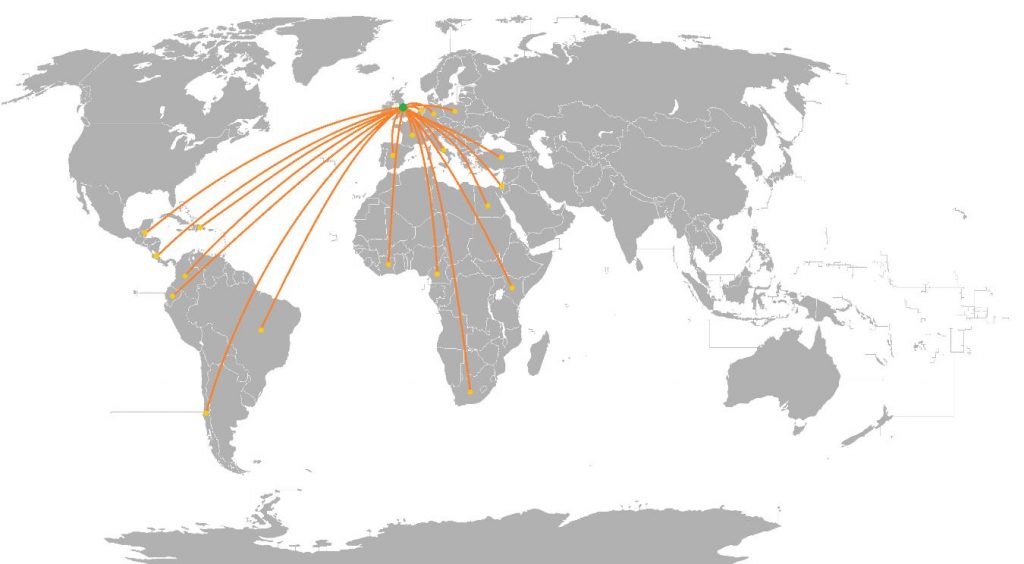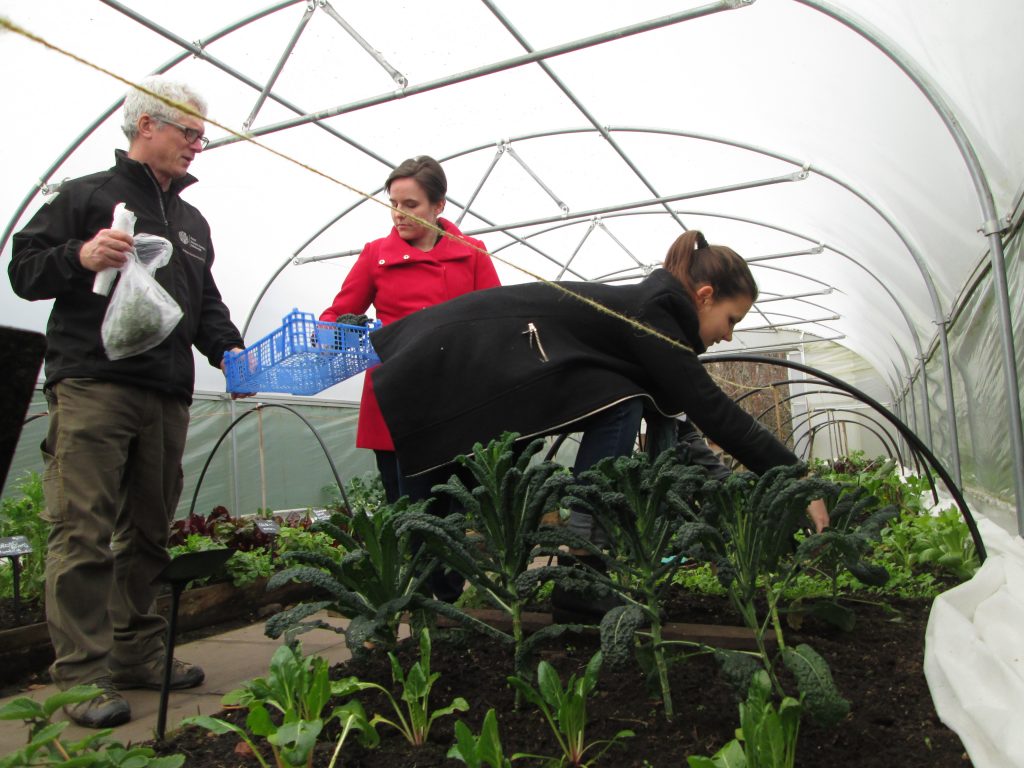Blog by Cristina Romero Rios, University of Edinburgh student
Have you ever asked yourself where the bananas that you eat come from? Have you wondered the same about tomatoes, lemons, peppers, asparagus, or for that matter any of the fresh food you eat?
The UK relies on many other countries to supply the fruits and vegetables people eat. If we talk about food security, the UK is highly dependent on foreign imports. At present the UK imports 50% of its vegetable needs and an incredible 90% of its fruit needs. This global supply system can cause problems in the UK if something happens in the source countries.
We don’t have to look very far for an example of this. At the moment, we are in a “courgette crisis”. But this is not the only vegetable that has been missing from the shops recently: tomatoes, lettuce, pepper and celery among other produce from southern Spain are also scarce. This is due to the severity of the current winter. This shortage has resulted in a never before seen, increase in the prices of these foods in UK supermarkets.
Coming from Colombia, I feel that fruit and vegetables from my country have a more vivid flavour than in the UK. And that is, of course, because at home in Colombia I am lucky to be able to eat these products in their freshest and most ripe state. So, why don’t we eat more locally grown produce here in the UK? Supermarkets have presented us with the impression that we can buy just about any fresh produce at any time of the year. This situation has now be given a name “Permanent Global Summertime” and has become so normal that it prevents consumers from developing an understanding of the seasonal nature of fruit and vegetables.
In the UK, and Europe in general, in each season different products are available. This seasonal shift in what is available should be seen as an opportunity to vary our diets throughout the year and be creative with produce in season. Eating local fruits and vegetables not only means we support local production, but that the impacts of food shortages beyond our borders can be lessened. However, the great taste of fresh produce in season is probably what will ultimately convince people to move away from the alure of Permanent Global Summertime.



Mariana Forsyth
90% of fruit from abroad? That is awful. I know that at the moment I can only buy fresh British apples ( slightly more frozen but often difficult to see origin) and expensive forced rhubarb.
Abd 50% veg -been getting very local kale and cabbage and parsnips and leeks yesterday in Granton. However would not feed all residents! Lots of work to get some food security back in UK.
Max Coleman
Hi Mariana,
Thanks for your experience of trying to buy local and finding it hard.
I have just been seeing on the news today that Scottish Local Authorities spent over £1.3 million on chicken from Thailand! Scottish Government is trying to encourage local procurement, but clearly a long way to go with food in some areas!
ben d
See, this is just the tip of the iceberg.
Remember the 80’s when it was rare to get something ‘English’ like strawberries out of season, now we’d have a fit if we couldn’t get our desired fruit or veg when we wanted it.
We invested vast amounts of money in infrastructure in other countries to make our lives more comfortable. Leaving the EU is going to be a shock, but one I feel that could do is good environmentally but not economically.
Think about it, what are the average farmer’s workers wages like in Ghana compared to Sussex? Could we even afford to eat a healthy diet?
I’ve had this same conversation with countless veggies and vegans. The most sustainable way to eat is local, no matter if it’s cabbage our a roast chicken. If we were to have to eat locally it would be almost impossible to be a healthy vegan in England. We’d struggle either way.
Those exotic fruits and vegetables grown in mass monoculture in countries that don’t have stringent farming controls of pesticides, herbicides and fertilisers are ruining our feeder countries and their communities.
And then there’s the dirty word of water scarcity, ask this while we moan about there being no courgettes in the supermarket it’s a global time bomb.
Food security has never been so unattainable in great Britain…
Max Coleman
Hi Ben,
Lots of very good points in your comment Ben. Developing local food supply chains is certainly going to answer some of the concerns you raise, but it will take time. The Scottish Government is trying to encourage local procurement for school dinners and yet much still seems to be coming from abroad. A long way to go, but at least people are starting to discuss these problems.
Roger Hyam
I find the “food security” issue rather interesting. It used to be talked of as “self sufficiency” but that conjures up images of Tom and Barbara Good in the 1970s!
Agricultural inputs include things like tractors and quad-bikes (and all their component parts such as rubber for the tires and rare earth metals in electronics for the control system) and information (GPS, GLONASS or Galileo, meteorology etc ). Even conventionally crop breading programmes rely on gene sequencing technologies. Glass for green houses or polythene for poly tunnels has to be manufactured in big computer controlled plants. All these things are an integral part of an industrialised, globalised economy. They arose with it and wouldn’t exist without it. Any vision of productive agriculture has to include them and their links to other countries.
More contentiously the import of rock phosphates has been a major part of the British agriculture for generations. Whether we could feed 64 million people on what could be recycled from sewage alone is an interesting question I’m sure my organic friends would love to discuss.
Therefore even if every calorie we consumed was grown in the UK it would still be very highly dependent on international imports and exchange of something else – so why not import a good proportion of our food as part of that trade where it is more efficient?
Personally my breakfast often consists of peanut butter and banana on one piece of toast followed by marmalade on another washed down with a mug of coffee. Only the bread could have been produced in the UK! True I often have porridge but even then I like a little maple syrup and sultanas with it and perhaps a cup of tea. Again only the oats from the UK (I have soya milk but could do cows milk at a push).
Normally security implies keeping things safe. We couldn’t keep the current British diet safe by growing it within these islands we would have to radically change it. To paraphrase infamous words from the Vietnam war we would have to destroy the diet in order to save it.
Slice of that great British/Yorkshire favourite Terry’s Chocolate Orange anyone?
Max Coleman
Hi Roger,
I agree with you that we can’t be totally self sufficient in food unless we radically changed our diet, and that’s not going to happen. Your analysis of breakfast was spot on and who would just eat porridge day after day when we have become used to so much variety. I guess the point is that we do import a lot of food we could produce ourselves and local production would be better for the planet.
It is a large and potentially complex debate, but we all have a stake in food. Thanks for your insightful input.